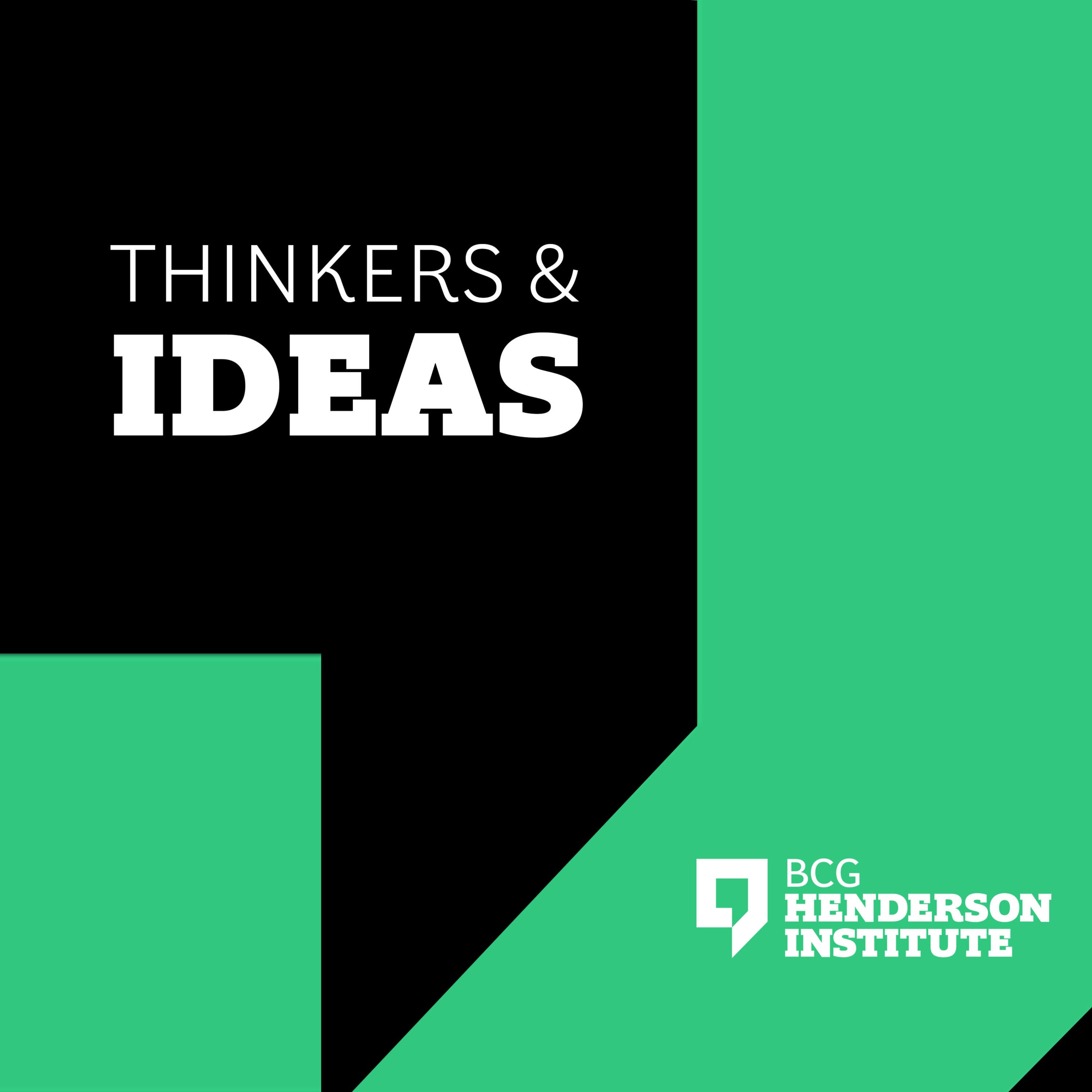

Thinkers & Ideas
BCG Henderson Institute
Inspiring and thought-provoking conversations with leading thinkers about influential ideas on business, technology, economics, and science. Hosted by Nikolaus Lang, Martin Reeves, and Philipp Carlsson-Szlezak.
For more ideas and inspiration, sign up to receive BHI INSIGHTS, our monthly newsletter, and follow us on LinkedIn and X.
For more ideas and inspiration, sign up to receive BHI INSIGHTS, our monthly newsletter, and follow us on LinkedIn and X.
Episodes
Mentioned books

7 snips
Jul 23, 2024 • 41min
How to Become Famous with Cass Sunstein
Renowned behavioral economist Cass Sunstein discusses fame, skill vs. luck, Bach vs. Taylor Swift as the greatest composer, social influences on fame, business implications, and the art of manipulating information and reputation cascades.

Jul 9, 2024 • 26min
The Ritual Effect with Michael Norton
Michael Norton, a Harvard Business School professor and expert in behavioral economics, delves into the fascinating world of rituals versus habits. He discusses how small rituals can bring purpose and pleasure to life, especially in the wake of COVID's disruption. Norton emphasizes the emotional significance of rituals for bonding and coping, and he shares innovative practices that have emerged during remote interactions. He also explores how rituals can enhance teamwork and even play a role in corporate mergers, redefining connections through shared actions.

Jun 25, 2024 • 31min
Survive, Reset, Thrive with Rebecca Homkes
Rebecca Homkes, a business strategy expert, shares her framework for leading through uncertainty - survive, reset, thrive. She discusses how to navigate uncertainty, survive shocks, reset strategies, and thrive long-term. Topics include the impact of AI on strategy, implementing the framework in personal life, and the balance between creative and competitive aspects of strategy.

Jun 11, 2024 • 38min
Perspectives on the Future with Esther Dyson, Rita McGrath, and Gary Shteyngart
Leading futurists Rita McGrath, Esther Dyson, and Gary Shteyngart discuss past predictions, the digital age, social media, science fiction, and methods for sensing the future. They explore predicting future trends, dystopian inspiration, human connections, and methods for contemplating the future. The podcast also touches on challenges in Korea's advanced economy, re-enchantment, permissionless organizations, potential disruption in advertising, and upcoming books and foresight.

May 14, 2024 • 31min
Look Again with Cass Sunstein
Renowned author and Harvard Law School professor Cass Sunstein discusses the power of reevaluating the familiar with Martin Reeves. They explore habituation, dishabituation, and strategies to avoid mental models that limit adaptability in corporations and personal life.

Apr 30, 2024 • 32min
Why We Die with Venki Ramakrishnan
Nobel Prize winner Venki Ramakrishnan discusses aging, longevity, and potential breakthroughs in prolonging healthy life. Topics include mechanisms of aging, interventions for longevity, societal implications, and the importance of clear communication in science.

Apr 16, 2024 • 30min
Making Sense of Chaos with Doyne Farmer
Doyne Farmer challenges traditional economic models, advocating for complex systems thinking to improve predictions. Topics include limitations of standard economics, benefits of agent-based modeling, applying alternative modeling in business, and how CEOs can embrace complexity thinking.

36 snips
Apr 2, 2024 • 32min
Co-Intelligence with Ethan Mollick
Professor Ethan Mollick discusses the impact of AI on business and education, emphasizing the importance of coexisting with AI. Topics include training people to use AI effectively, substituting vs complementing workers with AI, generating long-term value with AI, AI regulation, and AI's transformation of education.

Mar 26, 2024 • 31min
The Intelligence of Intuition with Gerd Gigerenzer
Gerd Gigerenzer, an expert on human decision-making, challenges the view of intuition as inferior to rationality. Topics include heuristics, power of intuition, using intuition in business, distinguishing right intuition, and AI using intuition. The podcast explores intuition as unconscious intelligence shaped by experience, the role of biases, and the relationship between intuition, improvisation, and problem-solving.

Mar 12, 2024 • 30min
Climate Capitalism with Akshat Rathi
In Climate Capitalism: Winning the Global Race to Zero Emissions, Akshat Rathi tells the stories of people around the world who are building impactful solutions to tackle climate change.Rathi is a senior reporter for Bloomberg News, focusing on climate and energy. He also hosts the weekly Zero podcast, in which he talks to the people leading the fight for a zero-emissions future. In his new book, Rathi argues that the best way to cut carbon pollution is by harnessing capitalism. Combating climate change requires a combination of smart policies, financing, technological innovations, and leadership—without killing markets or competition.Together with Martin Reeves, Chairman of the BCG Henderson Institute, Rathi discusses the essence of climate capitalism, how to scale up individual success stories, and how to navigate the challenging political context. Key topics discussed: 02:09 | Definition of climate capitalism07:19 | Success stories: Chinese EVs, Orsted11:31 | The need to combine tech, policies, and finance12:52 | How to scale case studies to big solutions16:24 | Navigating a polarized political context18:45 | Making climate solutions profitable24:06 | Where CEOs should start


